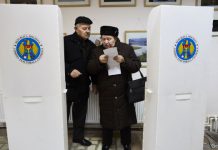FEW people have heard of Moldova—and when they have, it is usually for the wrong reasons. A frozen conflict with Russian-backed separatists in Transdniestria has hamstrung the country since 1992. A year ago a rigged election brought riots, followed by hundreds of arrests, scores of alleged beatings and rapes, and three deaths. The outrage led to a new election and the formation of a shaky pro-Western coalition government. Its youthful ministers are in sharp contrast to the greyness of the previous regime, nominally a Communist one but in fact crony-capitalist.
The new lot have thawed relations with Romania and launched a charm offensive in the West. A donor conference recently pledged €1.9 billion ($2.6 billion), half in grants and the rest in soft loans. China has dangled a $1 billion loan for infrastructure. The IMF has approved the governments economic policies: after an 8.5% drop in 2009, GDP is likely to grow by 1.5% this year. Yet Moldova will still be Europes poorest country. Hundreds of thousands of Moldovans work abroad, mostly illegally. Their remittances keep Moldova afloat.
Outsiders see more changes at the top than Moldovans themselves feel in practice. Reining in the budget deficit, over 8% of GDP in 2009, will mean rises in heating costs and cuts in a bloated public sector. Wrangles in the deadlocked parliament over the election of a new president waste time. Failure, says the constitution, would mean another general election that few want.
More important to voters is travel to the rest of Europe. This has got harder since Romania joined the European Union in 2007. The Romanians promise a special regime for Moldovans living within 30km (about 19 miles) of the border. But they also want to join the Schengen passport-free zone next year, which would create still more expense and hassle for Moldovans. The goal of visa-free travel to the EU is a long way off.
Changing Western minds means enacting reforms, not just talking about them. Officials speak excitedly of Estonia and Georgia as models. One sign of intent might be to liberalise aviation rules, allowing budget airlines to fly to Chisinau. That would be popular with passengers but bad news for the protected national airline, Air Moldova.
The biggest change has been in media freedom, tightly restricted under the previous government. Two new television stations have started broadcasting. Romanian television will return soon. But big reforms in the corrupt, Soviet-style bureaucracy must wait, as it seems must the rule of law. Investigations into official misbehaviour during last years riots have brought some sackings and suspensions, but no deep-seated changes—or even a truthful account of what really happened.






